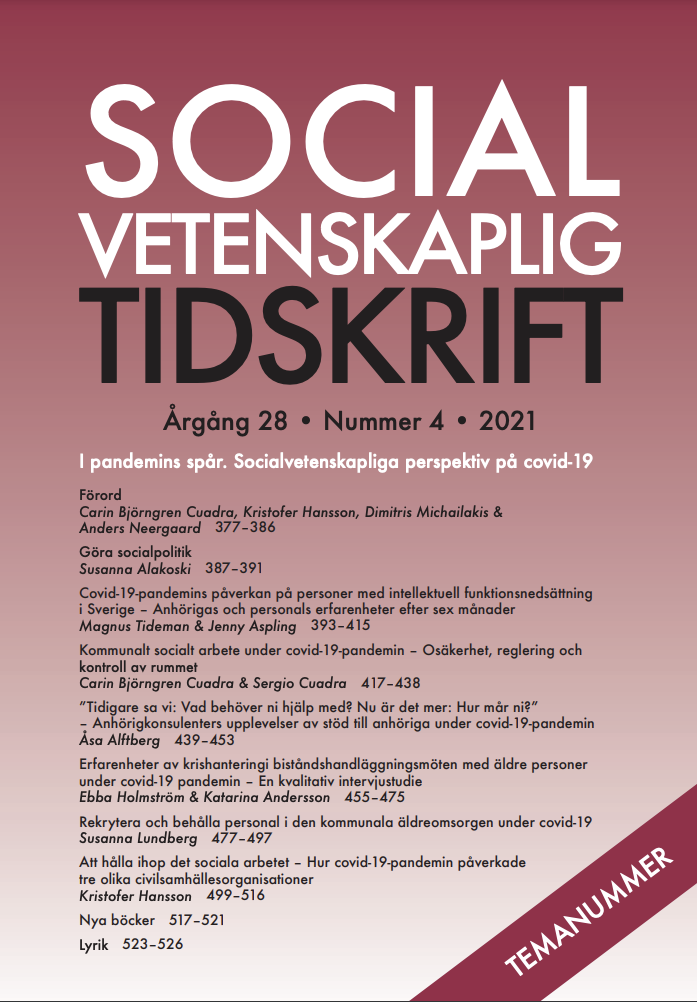Covid-19-pandemins påverkan på personer med intellektuell funktionsnedsättning i Sverige
Anhörigas och personals erfarenheter efter sex månader
DOI:
https://doi.org/10.3384/SVT.2021.28.4.4366Abstract
Personer med intellektuell funktionsnedsättning har sämre levnadsvillkor än befolkningen i övrigt och är ofta beroende av andras stöd för ett gott liv. Kunskap saknas om hur deras vardagsliv, hälsa och stödinsatser påverkas av den välfärdsutmaning som covid-19-pandemin innebär. I denna artikel redovisas och diskuteras anhörigas och personals bedömningar av pandemins påverkan på personer med intellektuell funktionsnedsättning i Sverige efter sex månaders pandemi i september 2020, det vill säga efter första vågen. 919 personer, 340 anhöriga och 579 anställda har anonymt besvarat en webbaserad enkät. Syftet med studien var att belysa hälsorelaterade och sociala effekter med fokus på vilka restriktioner som förekommit och vilka konsekvenser de bedöms ha fått för personer med intellektuell funktionsnedsättning. Resultatet visar att begränsningar i sociala relationer och inskränkningar i sysselsättning och aktiviteter har förekommit under covid-19-pandemin för personer med intellektuell funktionsnedsättning. Såväl anhöriga som personal noterar markant ökade problem avseende viktökning, stereotypa beteenden, humör/ångest, sömn, utåtagerande och självdestruktivt beteende liksom aggressioner. Smittskyddsinsatser i form av skyddsutrustning och social distansering har tillämpats men anpassad information som förklarar coronaviruset och restriktionerna har inte erbjudits alla. Flertalet som lever med intellektuell funktionsnedsättning är kontinuerligt beroende av stöd i sitt vardagsliv och möter därför dagligen många personer och riskerar i och med det att utsättas för smitta. För att kunna utveckla strategier för framtida pandemier eller kriser behövs mer kunskap om hur en pandemi som covid-19 påverkar personer med intellektuell funktionsnedsättning, fysiskt, psykiskt och socialt. Denna studie betonar vikten av att utveckla kunskaper och förberedelser för framtida pandemier för att förhindra social isolering och negativa hälsoeffekter för personer med intellektuell funktionsnedsättning.
Downloads
Publicerad
Referera så här
Nummer
Sektion
Licens
Copyright (c) 2022 Magnus Tideman, Jenny Aspling

Det här verket är licensierat under en Creative Commons Erkännande 4.0 Internationell-licens.
Allt material i Socialvetenskaplig tidskrift publiceras sedan 2022 (Vol 28 Nr 2) med omedelbar öppen tillgång (open access), under Creative Commons-licensen CC BY 4.0. Upphovsrätten till innehållet tillhör respektive författare.
Allt innehåll i tidskriften är fritt tillgängligt utan kostnad och får fritt läsas, laddas ned, kopieras, delas, skrivas ut och länkas. När innehållet används måste författare, källa och licens anges. Författaren kan fritt göra sin publicerade text tillgänglig på institutionella och internetbaserade arkiv, exempelvis sitt lärosätes digitala arkiv eller andra tjänster för detta.
Inga publiceringsavgifter tas ut vid publicering i Socialvetenskaplig tidskrift.


